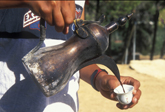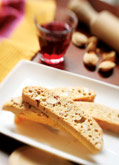

| {image_1} |
|---|
Good things come in small packages, they say, but sometimes the unattractiveness of the package belies the goodness of its contents. Take, for instance, the carob pod. Although the carob tree is quite majestic, reaching heights of 33 ft (10 m) with long leaves, sturdy branches, and cascading reddish flowers, the pods themselves are another story. Growing up to eight inches (20 cm) long, they are deep brown in color and filled with a thick mucous-like liquid that surrounds flat, bony seeds. Also called locust fruit, the pods are dried as food for both animals and people. They may not sound very appetizing, but their contents are amazing.
Continue Reading »
{image_1}Sit inside, in a booth, on a balcony, or on a sidewalk…but wherever you sit, enjoy the taste and the ambience of that wonderful Israeli phenomenon—the coffee shop. They pepper Jerusalem’s landscape; some are ultra-modern while others are tiny and barely recognizable from the street. Whatever the size, all are part of the “coffee culture,” which has taken Israel by storm.
Continue Reading »
{image_1}You may have seen them in the grocery store produce section: a fat, oblong fruit with a tough green skin. Maybe the tufts of fine prickly thorns (glochids) have already been removed. Like me, you may have wondered how on earth you would use them. They are the fruit of a paddle cactus that has flat, green pad-like leaves and long thorns, which, in Israel, are called sabra cactus. In other parts of the world, the fruit is referred to as prickly pears, cactus figs, or “tuna.” They can be green, yellow-orange, or red-purple, and there are many ways to serve them.
Continue Reading »
{image_1}Shavuot (Feast of Weeks or Pentecost), like other of the biblical festivals, was originally celebrated in relation to the agricultural seasons. It marked the end of the barley harvest and the beginning of the wheat harvest. As such, nature and the Divine have gone hand in hand on this holiday more than any other, and it is recognized as a wonderful time to appreciate the beauty of God’s creation.
Continue Reading »
{image_2} Of all the foods talked about in the Bible, figs are one of the most prevalent. Mentioned over 50 times, they have been valued throughout history and have served a variety of purposes. They are first mentioned in Genesis 3, where Adam and Eve confronted their nakedness. They deliberately disobeyed God’s only specific instruction, and unfortunately, the world was forever changed. Mankind became increasingly obsessed with the idea that “clothes make the man.” Adam and Eve’s eyes were drawn to the huge, sturdy fig leaves, and sewing a few together, designer clothing was born!
Continue Reading »
{image_2} Purim is the most wildly joyous of all the Jewish holidays. While it is not included in the list of feasts found in Leviticus 23, it is Bible-based, commemorating the story of Esther. My husband Tom and I have been celebrating the Levitical feasts for over 25 years, but even before we “discovered” these Feasts of the Lord, we were introduced to the feast of Purim.
Continue Reading »
By Charleeda Sprinkle, Assistant Editor
So what might you enjoy snacking on while walking, biking, hiking, or touring around Israel? Besides Israel’s alluring ice cream, sugar-dusted Turkish delights, sticky baklava (sweet Greek pastry), and large array of tempting baked goods, I can name a few that are very Israeli, each one with a fascinating history.
Continue Reading »
{image_2} Each of the biblical feasts has a symbolic food associated with it – even Yom Kippur (Day of Atonement), the most severe fast of the year. A pre-fast feast helps worshippers make it through the 25-hour fast, which is observed much like a Shabbat (Sabbath) meal, except it is eaten before sundown. Table linens and clothing are white to symbolize the hope of sins forgiven. The best dishes are used, two candles are lit, and blessings over the wine and bread are recited. Sometimes the bread is decorated with birds to remind them that just as birds fly, so their prayers will rise quickly and be answered.
Continue Reading »
By Charleeda Sprinkle
Assistant Editor
{image_3} “When the word ‘greatness’ comes to mind, Golda Meir comes immediately to the forefront. Her commitment to her Land and to her people was the paragon of human dedication. Her complete involvement, tempered with love, fired by fierce devotion, caused the world to know that she was a true mover of mountains.” What a great description of Israel’s fourth prime minister, who was only the third woman in the world to hold such an office. David Ben Gurion, Israel’s first prime minister, called her the “only man in the government”!
Continue Reading »
Tu'Bshvat: Happy New Year for Trees
{image_1}Tu’Bshvat is Israel’s Arbor Day, every year on the fifteenth of the Jewish month of Shvat, which falls this year on January 22. Though it is not a biblical holiday, it does have its roots in biblical law, as fruit had to be tithed according to its age, so a New Year for trees was created from which the age of all trees could be calculated.
Continue Reading »All logos and trademarks in this site are property of their respective owner. All other materials are property of Bridges for Peace. Copyright © 2025.
Website Site Design by J-Town Internet Services Ltd. - Based in Jerusalem and Serving the World.